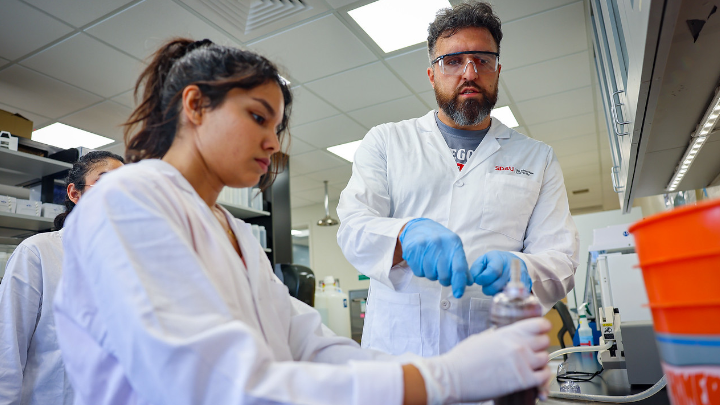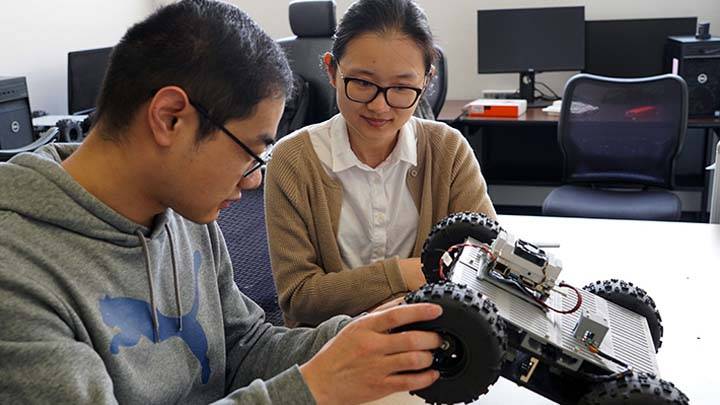SDSU research funding total nears $230M
SDSU’s research enterprise has grown by over 60% in 3 years

San Diego State University researchers secured a record-breaking total of funding with work that seeks to empower diverse leaders, create new materials and technologies, and foster a healthier, safer population.
Over $229.8 million in grants were awarded to the university and the SDSU Research Foundation during 2023-24 for research, scholarship and creative activities.
“Time and time again, SDSU continues to prove itself as a powerhouse for impactful and interdisciplinary research in California and internationally,” said Hala Madanat, vice president for research and innovation and leader of SDSU’s Division for Research and Innovation. “Our concerted efforts to cultivate collaborative problem-solving, expand training opportunities, and invest in research infrastructure are paying off.”
With $37.6 million more in funding compared to 2022-2023, this past year saw the greatest year-over-year percentage change (nearly 20%) in total funding of the past 10 years. This year marks the third consecutive research funding record for SDSU.
“Our original revenue projection anticipated a 40 percent increase in funding over five years, and in only three years, funding for research, scholarship and creative endeavors has grown by over 60 percent,” Michèle G. Goetz, associate vice president and chief executive officer of SDSU Research Foundation, wrote in a message thanking her staff and SDSU researchers for their work. “We're proud to support SDSU's faculty and the research enterprise as we surpass the $200 million milestone.”
Overall, 374 principal investigators secured 867 grant awards from 360 funding sources, primarily in areas that are key for the economic development of San Diego and Imperial Valley.
Building Upon SDSU Research Strengths
During the 2023-2024 fiscal year, SDSU researchers continued the impactful work that the institution has been renowned for.
Reaching a historic high of $40.8 million in funding from the National Institutes of Health, nearly 100 funded projects are addressing health disparities in Hispanic, multilingual, and LGBTQ+ communities and developing better treatments for cancer and mental health.
SDSU researchers’ monitoring of environmental toxins in southern California beaches, rivers and lakes influence policy recommendations for the Tijuana River sewage crisis, accessible hygiene solutions for unhoused communities and Salton Sea agricultural practices.
With $16.3 million in funding from the National Science Foundation (also a university record high total), SDSU is expanding its role in improving energy efficiency across industrial sectors, protecting power grids from cyber attacks and solving real-world problems through applications of artificial intelligence with additional high-performance computing resources. These grant-funded projects increase professional development opportunities for student engineers and computer scientists.
Diversifying the Workforce
Thanks to an influx of funding to diversify the region’s workforce, the most in-demand jobs in the region will be filled by SDSU trainees and people trained by SDSU experts.
Managed by the California Jobs First initiative, $13 million in state funding supports job creation and curriculum development to fuel a carbon-neutral economy across San Diego and Imperial Valley, with key priorities determined by grassroots organizations and historically underserved communities.
Social work master’s degree candidates who are low-income can work towards licensure and fill critically needed positions with less financial worry thanks to a $1.24 million grant from the Prebys Foundation dedicated to supporting the graduate program. An additional $10 million from dozens of charitable foundation partners is dedicated to extending education for incarcerated individuals and increasing access to college for first-generation students, among other projects.
Five million dollars from the U.S. Department of Education will go toward embedding teacher candidates and future educational leaders within school environments where they can learn to support students with disabilities and other special needs.
Other projects with ongoing funding enable training for mental health practitioners and bilingual educators to succeed in their careers as well as the design and evaluation of interventions to ensure more disabled youth can earn a livable wage.
A New Kind of R1
SDSU’s role as a Hispanic-Serving Institution (HSI) and Asian American Native American and Pacific Islander-Serving Institution (AANAPISI) elevated its selection in national funding applications that prioritized research at minority-serving institutions. Over $1 million in grant funding supports further development and expansion of evidence-based practices to serve diverse student populations through the APIDA Center, Black Student Success initiatives, Behner Stiefel Center for Brazilian Studies and other campus resource centers.
With revisions to the Carnegie Classification of Institutions of Higher Education research designations, SDSU is also expected to exceed the thresholds required for Carnegie to designate the university as having very high research activity, or a prestigious “R1” ranking, in early 2025.
SDSU has graduated more than 70 doctoral students and spent more than $50 million on research expenditures for at least the past 10 years, demonstrating that the university has been operating at a very high level of research for over a decade.
“Four years ago we launched a strategic plan calling for SDSU to become a new kind of research institution, equitably impacting all segments of our SDSU community, including those traditionally underrepresented,” said SDSU President Adela de la Torre. “Growing our research while holding true to our commitment to excellent teaching and community service should be a great source of pride to everyone associated with SDSU.”















